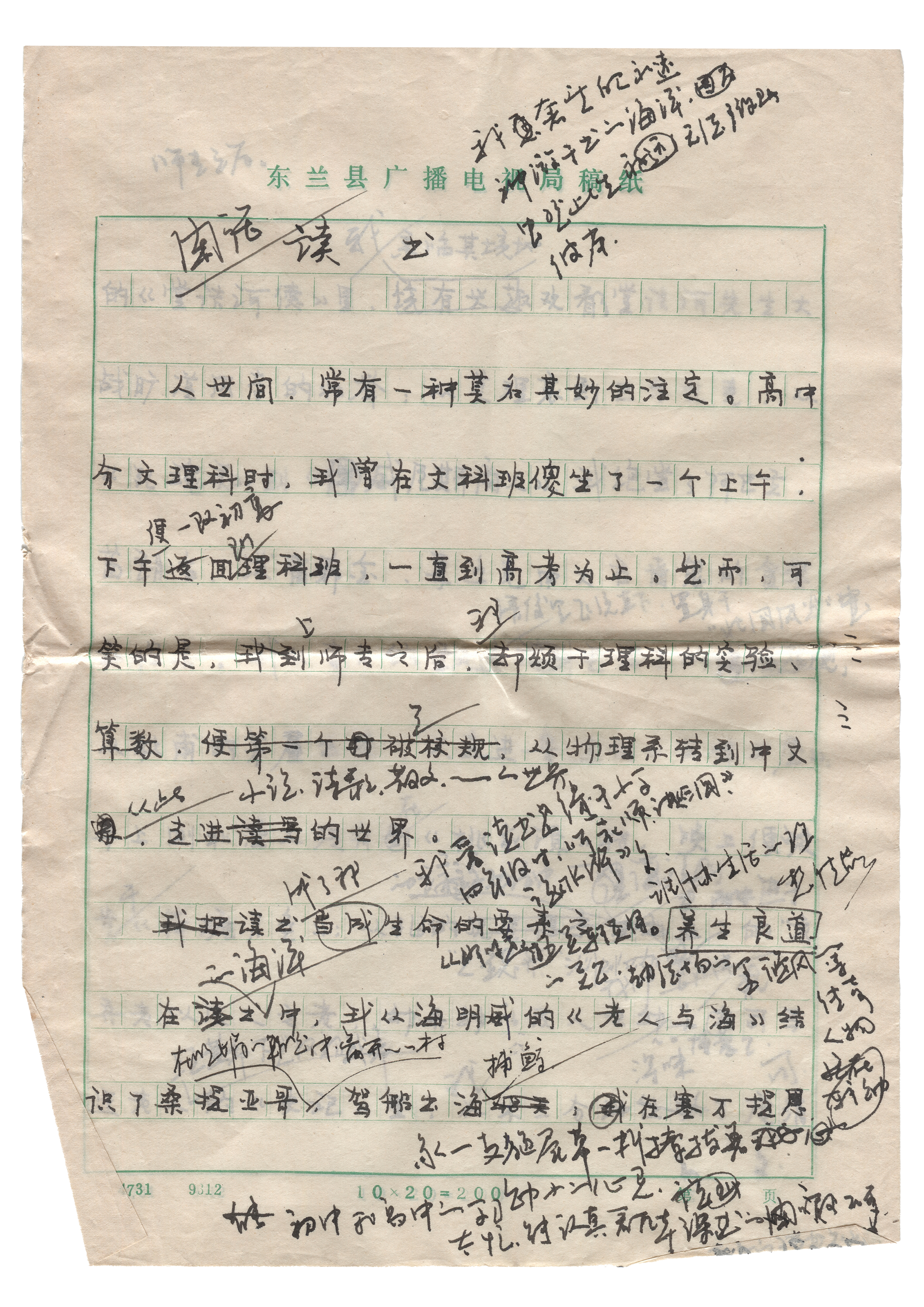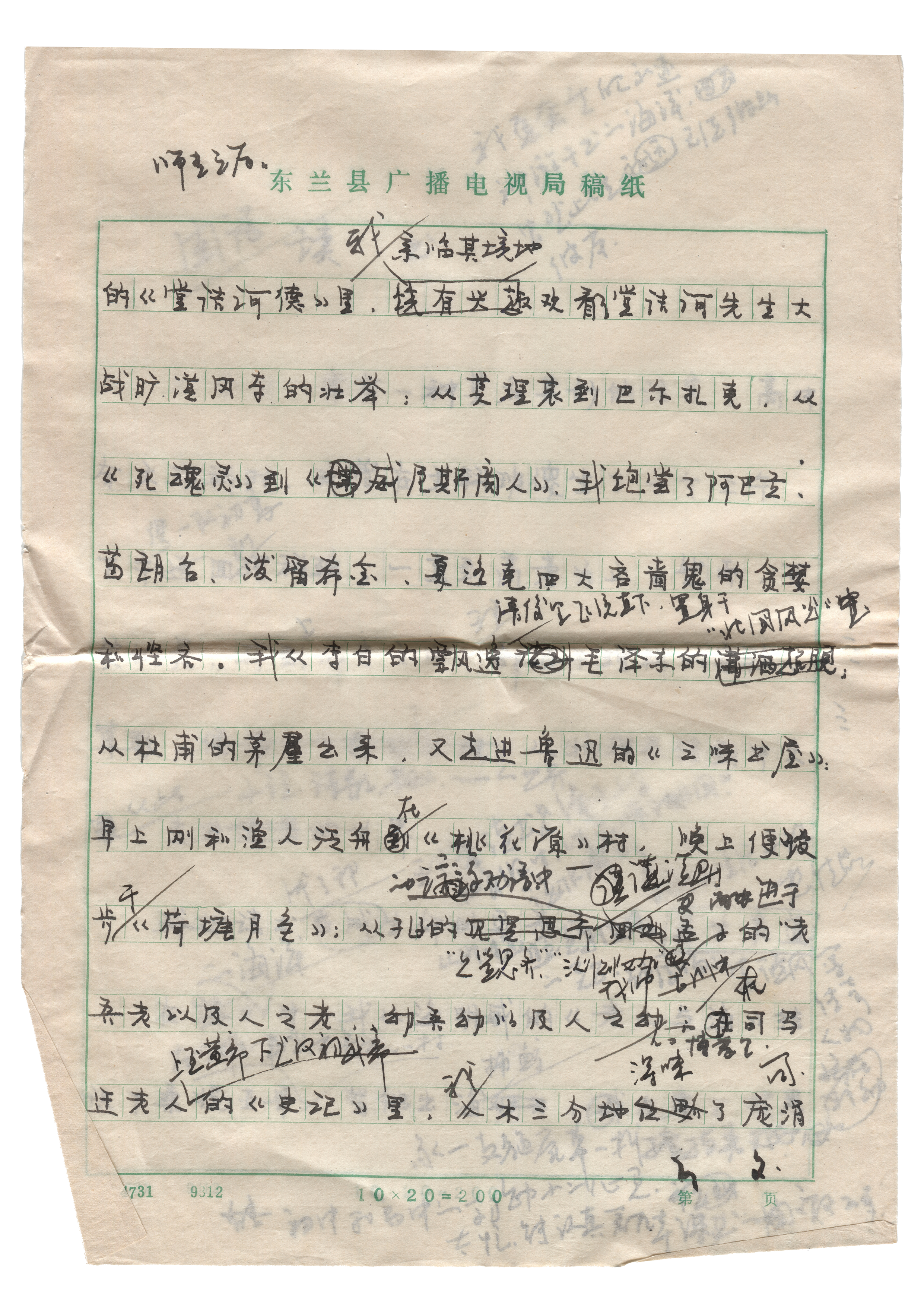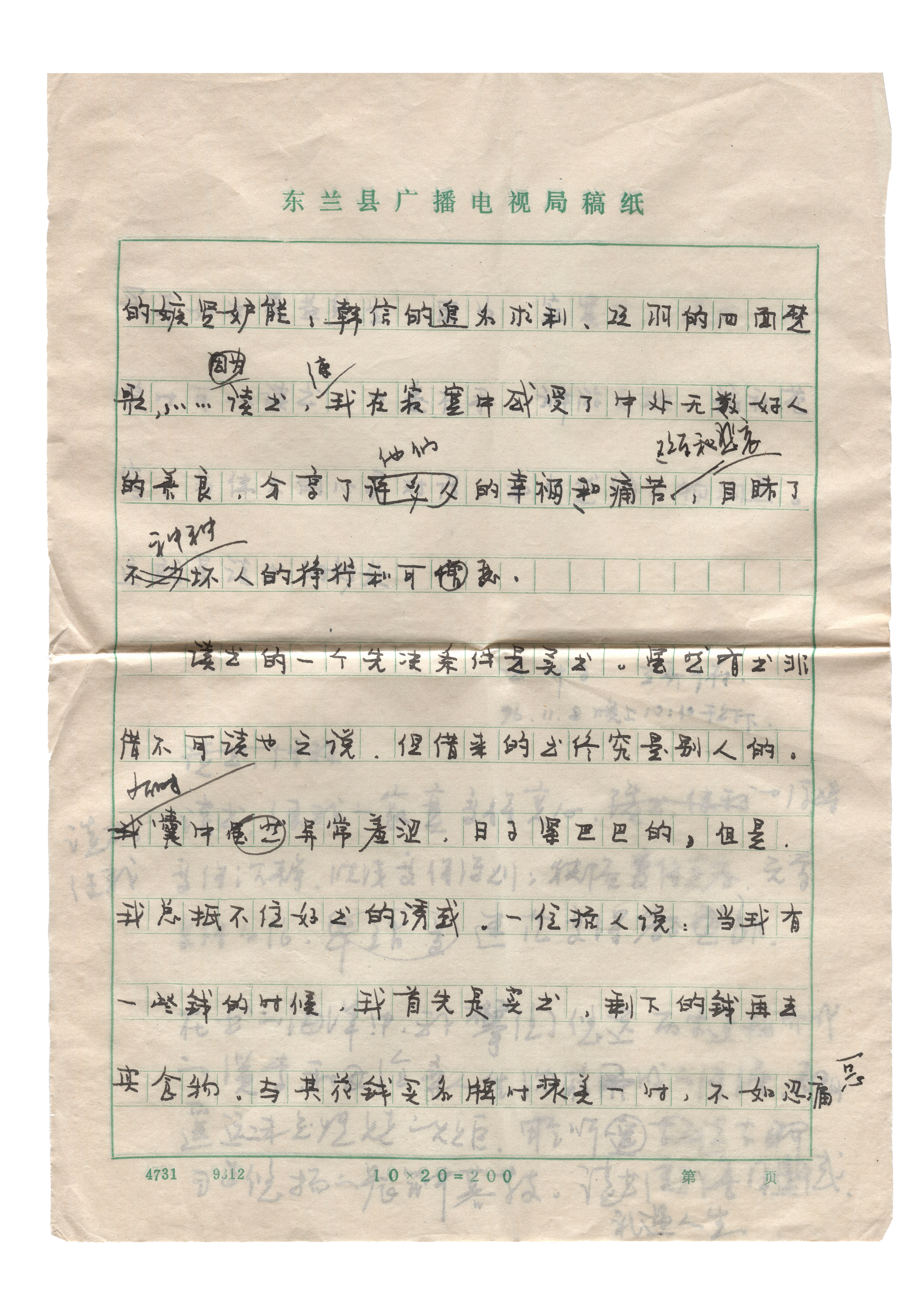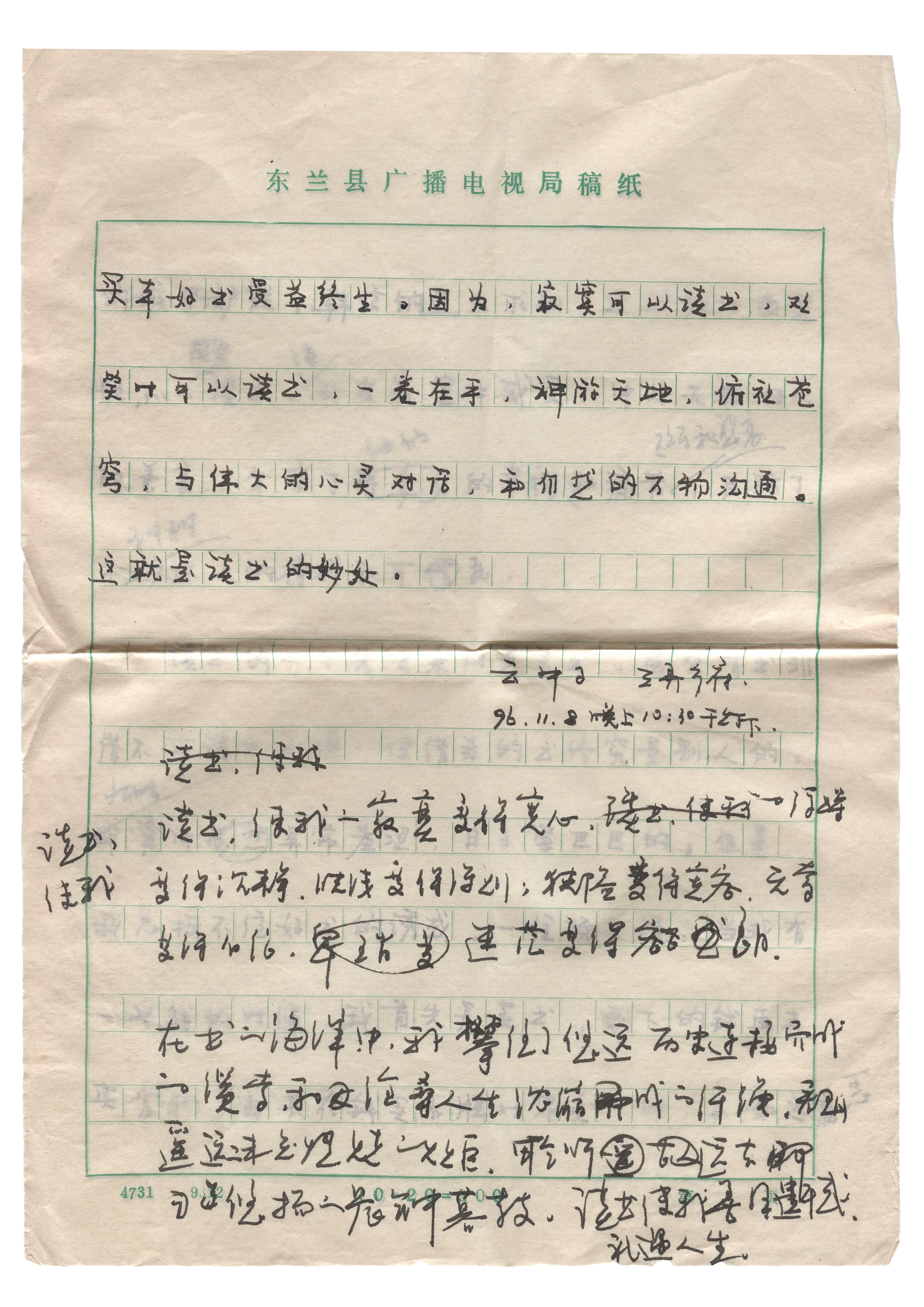信件起止年代(1987-5-21—1995-4-9)
主要收信地址
Main mailing addresses
点击进入该收信地址的信件阅读 (共计51封来信)
Click the addresses below to read the letters (51 letters in total)
︎
雒容镇五七中学(初中)
柳州市建五公司中学(初中)
鹿寨县雒容中学(高中)
柳萍的主要生活动向(重要节点)年表
Chronology of Liuping's Major Life
Movements (Important events)
柳州市建五公司中学(初中)
鹿寨县雒容中学(高中)
柳萍的主要生活动向(重要节点)年表
Chronology of Liuping's Major Life
Movements (Important events)
1987—1990 初中
1990-7 中考
1990—1993 高中
1990-7 中考
1990—1993 高中
1993-7 高考
1993—1994 高职(就读外贸专业)
1995 赴北海市工作
1993—1994 高职(就读外贸专业)
1995 赴北海市工作
信件中出现的人物
People appearing in the letters
People appearing in the letters
柳萍的家人们
爸爸——李金龍 妈妈——熊继芳
二弟——李仁奎 三弟——李仁良(小名灵洪)
仁奎的朋友
爱华
爸爸——李金龍 妈妈——熊继芳
二弟——李仁奎 三弟——李仁良(小名灵洪)
仁奎的朋友
爱华
柳萍的朋友们
中学同乡
秀华、 燕萍、 智鸿、书妮、 凤莲、 觉生
李莹莹、 泽美、 覃国荣、华英、 凤翔
高职好友
仁辅、英华、丽芸、农青华、星东
中学同乡
秀华、 燕萍、 智鸿、书妮、 凤莲、 觉生
李莹莹、 泽美、 覃国荣、华英、 凤翔
高职好友
仁辅、英华、丽芸、农青华、星东
同名个展
周周:寄给1991年三月的李柳萍 (2021)
solo exhibition of the same title
“Zhouzhou: Letters For Liuping in March 1991”, 2021, White Field, Beijing, China
在柳州旧货市场里的一个地摊上,我偶然发现了数十封寄给同一人的信,收信人是一个叫李柳萍的女孩。信件的日期从她的中学时代直至工作后(1987—1995),其中也包含了她自己以及家人所写下的信。
大多数信都分别来自柳萍的两位同学,智鸿与书妮。在 1991 年的 3月,智鸿带着因家境未能继续读书的遗憾连续给柳萍寄去了两封信,短促而焦急,又分外地感伤。他在信中描述着家中正值春耕的水田,起早摸黑的劳动,却在结尾希望柳萍能来,想给她说上许多有趣的事。
书妮则在初中到高中毕业期间不间断地给柳萍去信,有时刚结束考试就急匆匆地写下两页纸,迫不及待地有好多话想说与柳萍听。
同学们常在信中附上摘录的青春寄语,问候对方什么时候放假,补课,以及铃声即响时的停笔。这些来自三十年前,他们十几岁正值青春蓬勃时的话语,以及当中的情绪,几乎不变地同样发生在我们身上并延续着。
网络上再难以找到柳萍的信息以及那几所中学的留影,而我的父母与信中的人们都生于广西桂北的乡镇,年纪与经历都十分相似。我将父母过去留下的照片与这些信件并置,作为一种对那个正发生变革的时代中,柳萍与其他年轻人,以及我不曾得见过的青年时期的父母辈们生活样貌的补全。
这数十封信与包含的物件折合成为了一个巨大的时空和强烈的情感集合。我的心情在其中仅有简单的愿望,这奇妙又动人的体验,一定要传递与所有人。
大多数信都分别来自柳萍的两位同学,智鸿与书妮。在 1991 年的 3月,智鸿带着因家境未能继续读书的遗憾连续给柳萍寄去了两封信,短促而焦急,又分外地感伤。他在信中描述着家中正值春耕的水田,起早摸黑的劳动,却在结尾希望柳萍能来,想给她说上许多有趣的事。
书妮则在初中到高中毕业期间不间断地给柳萍去信,有时刚结束考试就急匆匆地写下两页纸,迫不及待地有好多话想说与柳萍听。
同学们常在信中附上摘录的青春寄语,问候对方什么时候放假,补课,以及铃声即响时的停笔。这些来自三十年前,他们十几岁正值青春蓬勃时的话语,以及当中的情绪,几乎不变地同样发生在我们身上并延续着。
网络上再难以找到柳萍的信息以及那几所中学的留影,而我的父母与信中的人们都生于广西桂北的乡镇,年纪与经历都十分相似。我将父母过去留下的照片与这些信件并置,作为一种对那个正发生变革的时代中,柳萍与其他年轻人,以及我不曾得见过的青年时期的父母辈们生活样貌的补全。
这数十封信与包含的物件折合成为了一个巨大的时空和强烈的情感集合。我的心情在其中仅有简单的愿望,这奇妙又动人的体验,一定要传递与所有人。
At a stall in the Liuzhou flea market, I
came across dozens of letters addressed to the same person. The recipient was a
girl named Li Liuping. The letters date from her middle school years to working
time(1987–1995). There were also letters written by herself and her family.
Most of the letters came from Liuping’s two classmates, Zhihong and Shuni. In March 1991, Zhihong sent two consecutive letters to Liuping with regret that he could not continue his study because of his circumstance. The letters were short and anxious, but also extraordinarily sentimental. In the letter, he described the paddy field in spring at home, working from dawn to dark. But at the end of the letter, he hoped that Liuping could come, and wanted to tell her many interesting things.
While Shuni wrote to Liuping continuously from middle to high school graduation. Sometimes she hastily wrote several pages just after the exam, couldn’t wait to speak a lot to Liuping.
The classmates often attach youth messages they excerpted, greeting each other when they are on vacation and when they go to tuition, you can even see that they stopped writing as soon as the class bell rang. These words and emotions that came from thirty years ago when they were in their teens, happen to us almost unchanged and are continued by us.
It is difficult to find information about Liuping and photos of those middle schools on the Internet, while my parents and the people in the letter were all born in the towns in northern Guangxi, and they were very similar in age and experience. I put the old photos of my parents together with these letters as a kind of complement to the life of Liuping and other young people in the changing era, as well as the life of my parents in their youth that I have no chance to see.
These dozens of letters and the objects contained are combined into a huge collection of space-time and strong emotions. There is only a simple wish that I want to pass this wonderful and moving experience on to everyone.
Most of the letters came from Liuping’s two classmates, Zhihong and Shuni. In March 1991, Zhihong sent two consecutive letters to Liuping with regret that he could not continue his study because of his circumstance. The letters were short and anxious, but also extraordinarily sentimental. In the letter, he described the paddy field in spring at home, working from dawn to dark. But at the end of the letter, he hoped that Liuping could come, and wanted to tell her many interesting things.
While Shuni wrote to Liuping continuously from middle to high school graduation. Sometimes she hastily wrote several pages just after the exam, couldn’t wait to speak a lot to Liuping.
The classmates often attach youth messages they excerpted, greeting each other when they are on vacation and when they go to tuition, you can even see that they stopped writing as soon as the class bell rang. These words and emotions that came from thirty years ago when they were in their teens, happen to us almost unchanged and are continued by us.
It is difficult to find information about Liuping and photos of those middle schools on the Internet, while my parents and the people in the letter were all born in the towns in northern Guangxi, and they were very similar in age and experience. I put the old photos of my parents together with these letters as a kind of complement to the life of Liuping and other young people in the changing era, as well as the life of my parents in their youth that I have no chance to see.
These dozens of letters and the objects contained are combined into a huge collection of space-time and strong emotions. There is only a simple wish that I want to pass this wonderful and moving experience on to everyone.
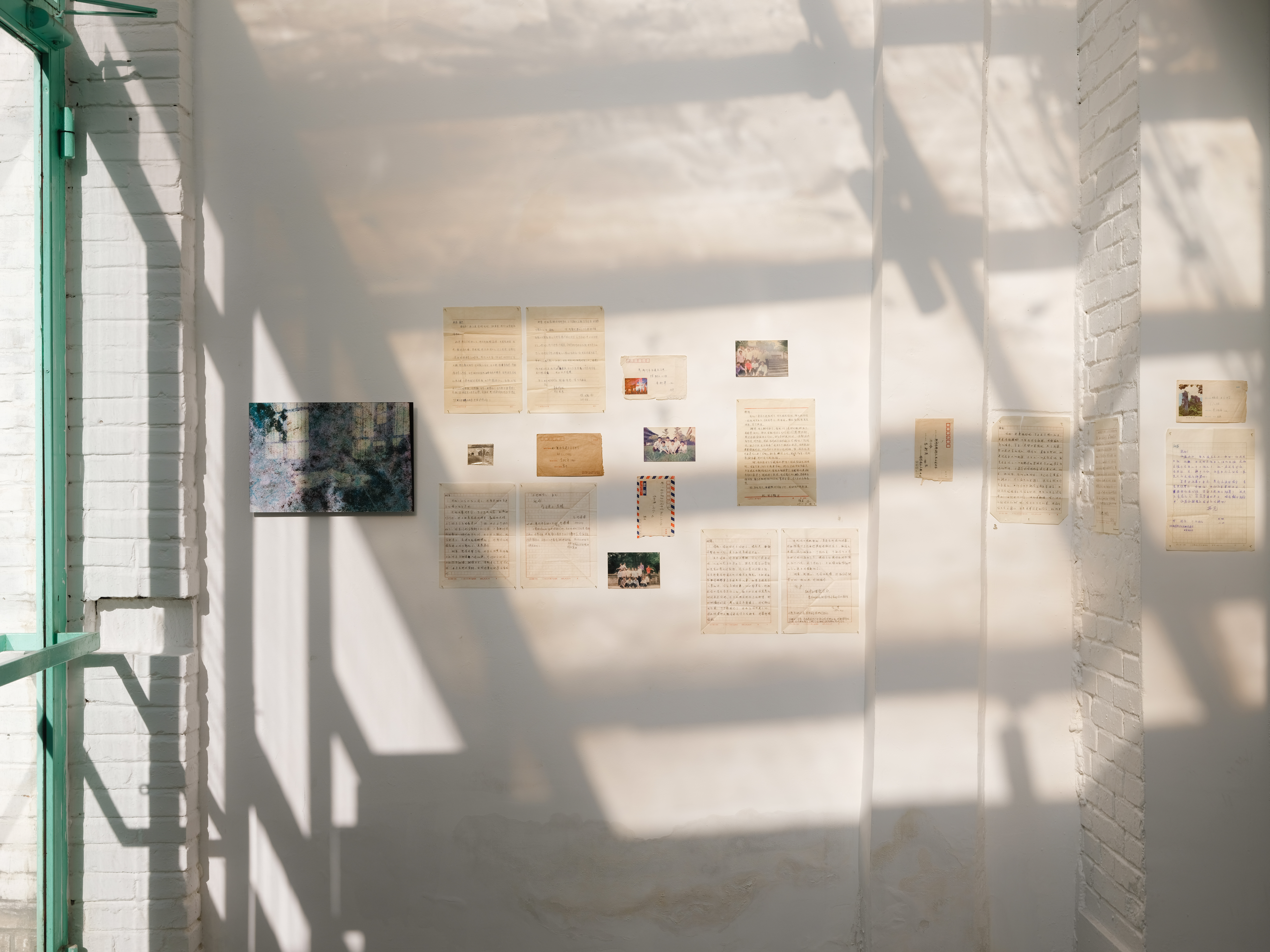



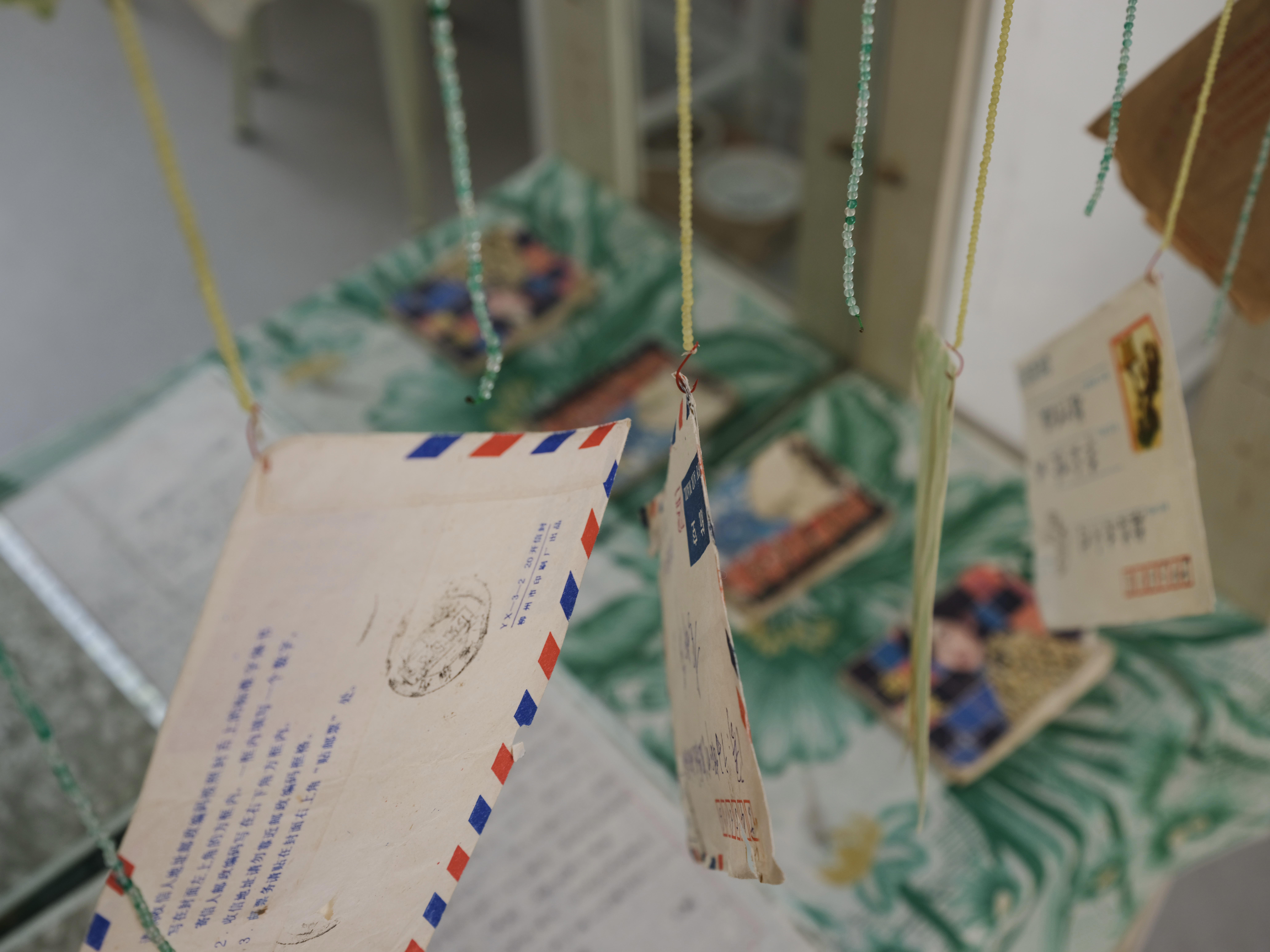




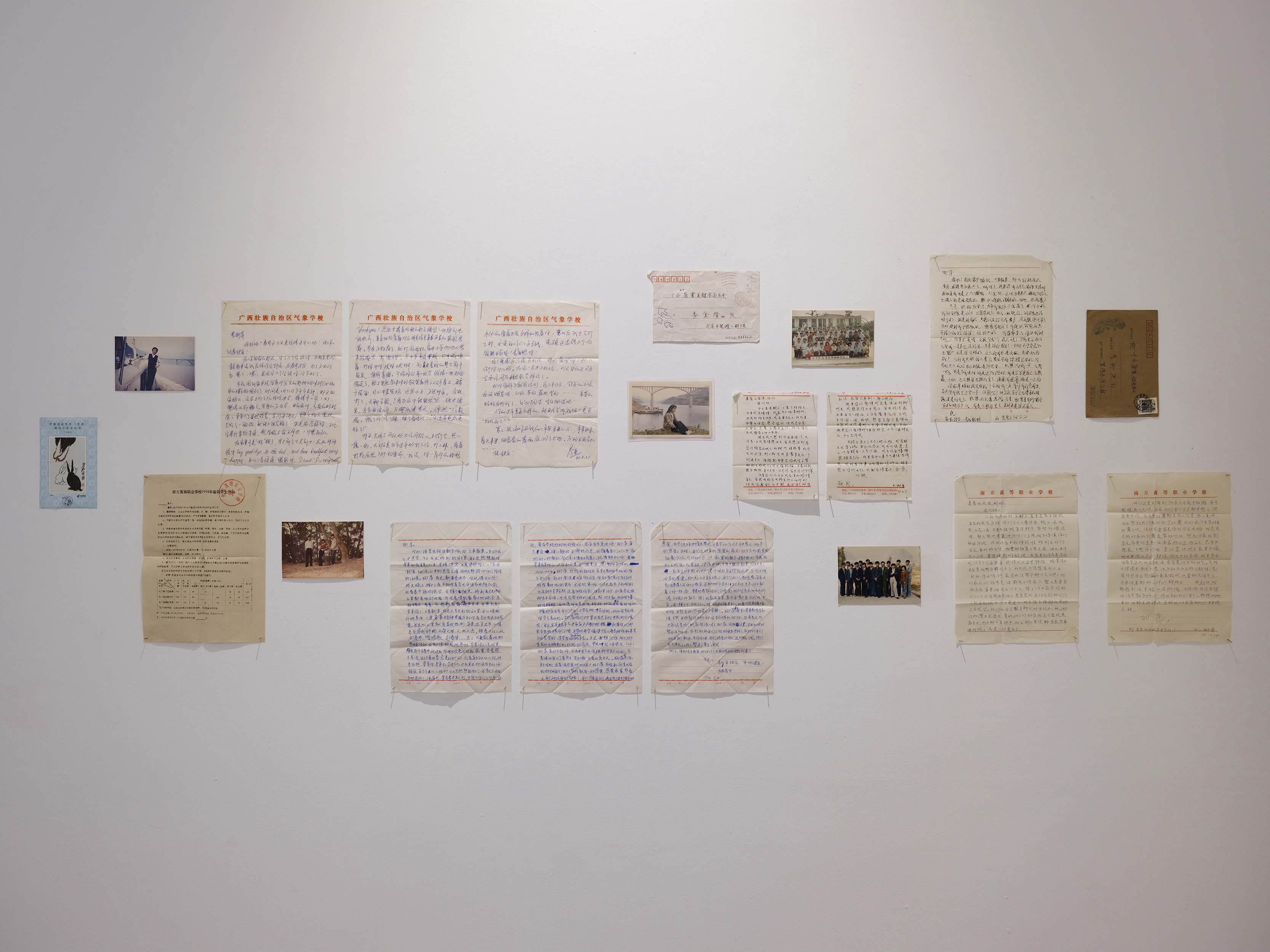

寄给1991年三月的李柳萍
Letters For Liuping in March 1991 (2021)
Short documentary, 18’22’’, mandarin
Screening: World Nomadic Shorts Film Week, UCCA, Beijing, China
Award: Top 10 Documentary
Vimeo (code: 5926)
1991年三月,柳萍与往昔的同学们已逐渐分别,但彼此仍持续着书信的往来。三十年后,这些信件被一个女孩从家乡的旧货市场里找到,一个异乡人一同跟随她来到这里。从广西北部的山城到南边的海湾,他们意外到达了信中的人们曾生活过的地方。
Liang Guo, Director & Producer & Screenwriter
Zhouzhou, Screenwriter & Key Cast
In March 1991, Liuping and her former classmates had grown apart but continued to write to each other. Thirty years later, these letters are found by a girl from a flea market in her hometown, and a stranger follows her along. From the mountain towns of northern Guangxi to the bay in the south, they accidentally arrive at the place where the people in the letters once lived.
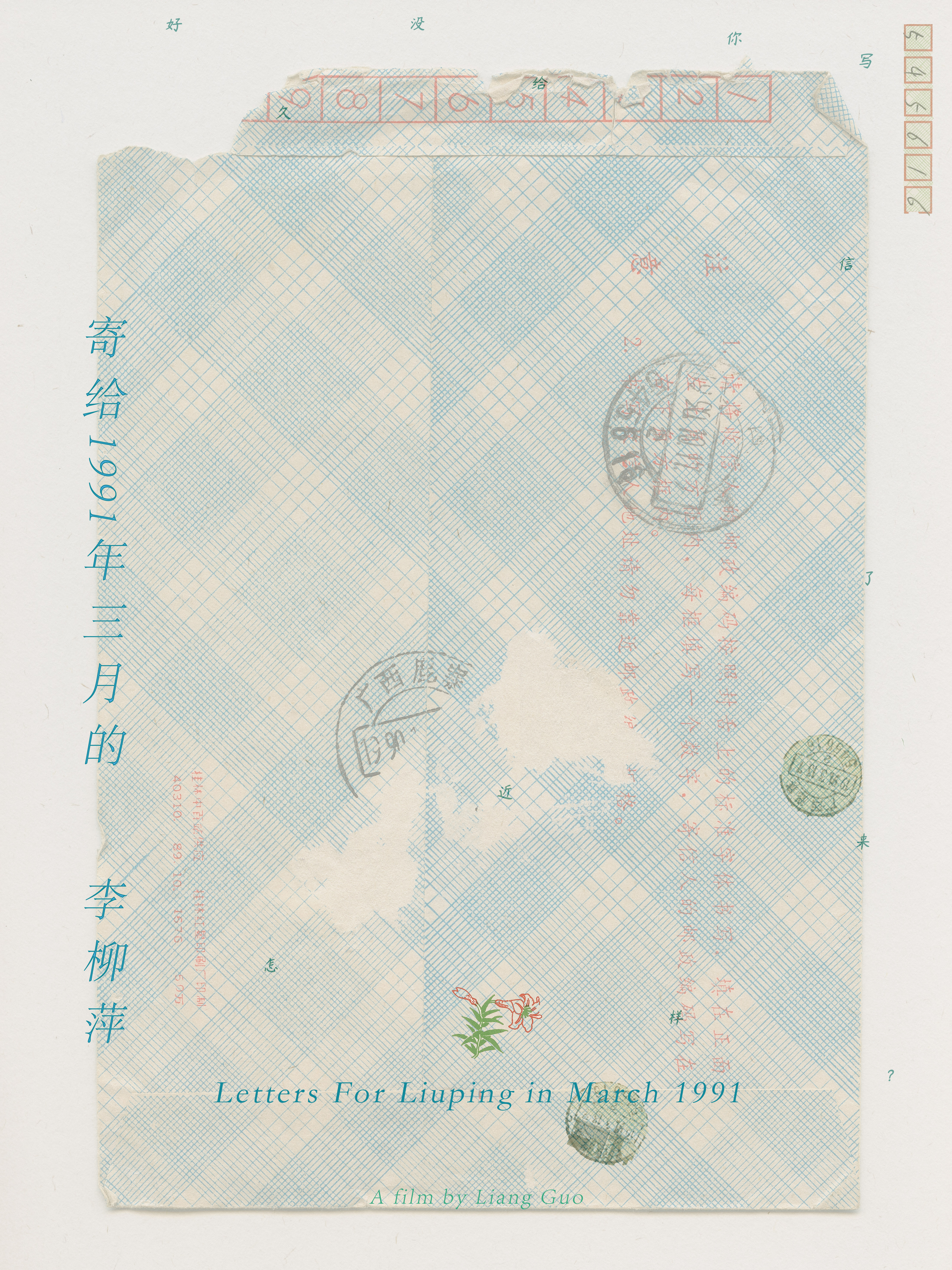
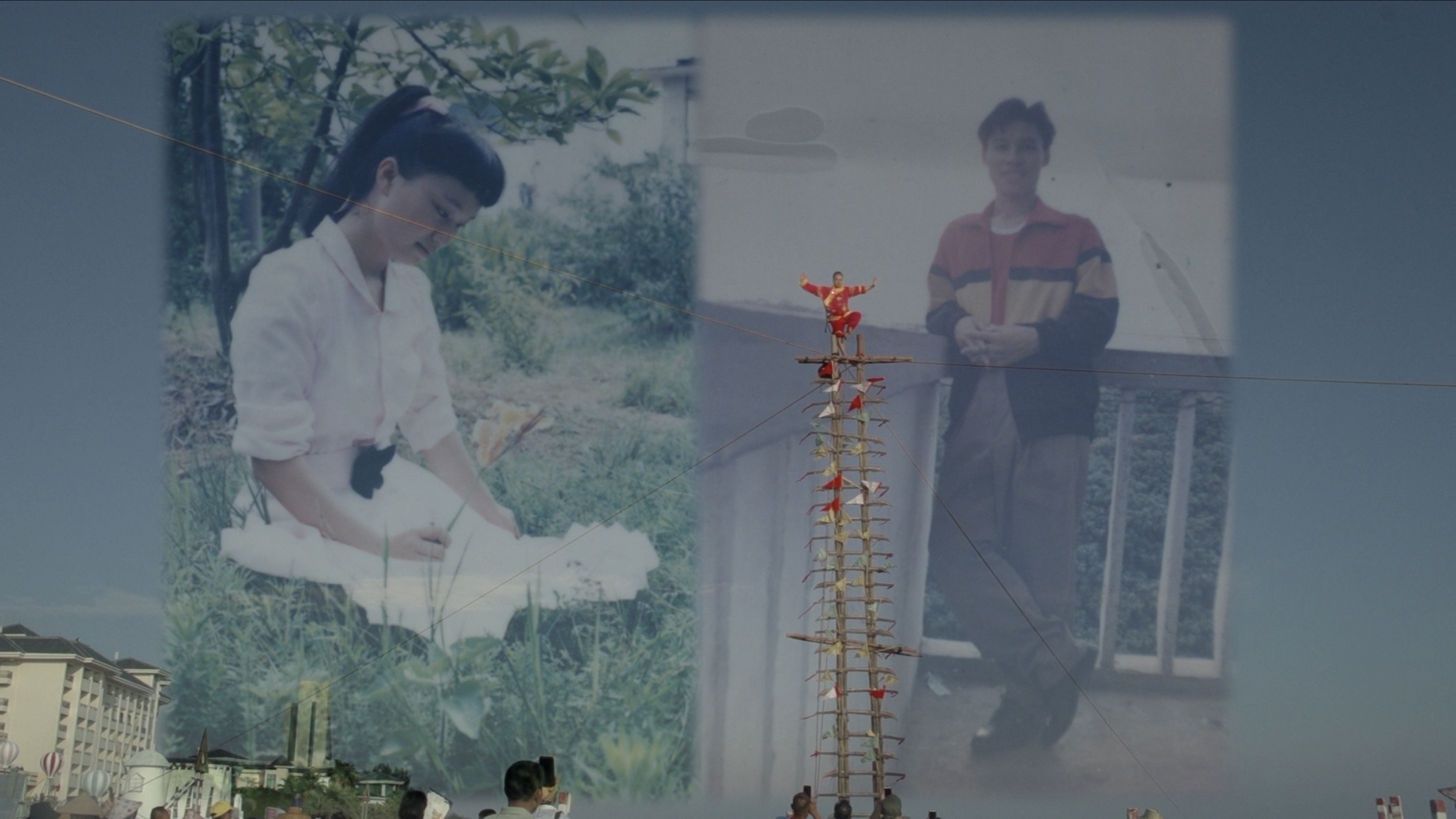
Still frame ©Liang Guo
后记
Afterword
爸爸妈妈最好的时光,以及留下的照片与文章
The Best Times of Mom and Dad, Along with the Photographs and Articles They Left Behind
“我在父亲用来收录剪报还有摘抄词句的记事本里发现了这份草稿(写于1996年11月8日)。是在我出生的前两年写的,叫闲话读书,这时他已经三十一岁了。我读来觉得很惆怅。他写的几乎都是大学时的事情,那是他最自由的时光了,我从前只得在照片里见过他那个意气风发的样子。在这几张稿纸中我头一次见识到他也是顽皮的——他曾在文科班傻坐了一上午,原是物理系出身,在师专里烦于做实验和算数便头一个破了校规转到中文系去。
在学校的几年他又进了书法社,自学小提琴,头发留得快赶上费翔。红色的POLO衫,下边配一个黑色的喇叭裤,架着个厚眼镜。妈妈说他在学校里骑车,因为个子小,身材细细的,这个红色短袖弄得有几个男同学以为他是女生,于是猛蹬单车追他,后来发现是我爸,又把他骂了一顿。
然而在毕业刚得分配的那年爸爸就被告上了法庭,因为在山里的爷爷不愿将土地分给别人。他回家跪在地上求爷爷,爷爷本来就性子犟,又去甩了村长的水烟袋,奶奶也劝不住。
我不知道他是如何坚忍地度过这个时期的,但读书明显让他找到浪漫和自由。他很喜欢《堂吉诃德》,小时候家中的书架上满是他读书和工作几年攒下来的旧版书,《小妇人》、《红与黑》、《十日谈》……他到妈妈就读的那个高中当老师时,还在学校晚会和下课后同另一位老师教同学们跳交谊舞,结果被校长找去谈话。
爸爸的一生都处在他从书中得到的世界与现实的矛盾中。体制里的工作还有原生家庭的责任使得他越发地严肃,拘束,喜怒无常。直到这几年接近退休后松弛了许多,人也变得可爱了些。有时我感到他的辛酸与扭曲。而先锋的女性主义书籍也末能使他由此解脱了对女性形象的传统看法,包括对自己。他知道这个世界如书中所写,有一群人那样过活,但离他太遥远了,他从这个士地上再难飞出去。曾经他有过可以去往珠海工作的机会,但因我的户口无法转出,他又背着行李一路站票回了广西。如果我们当初能去了那里,生活会好一些吗,我们一家都这么幻想过。”
